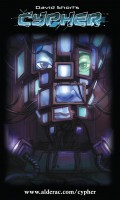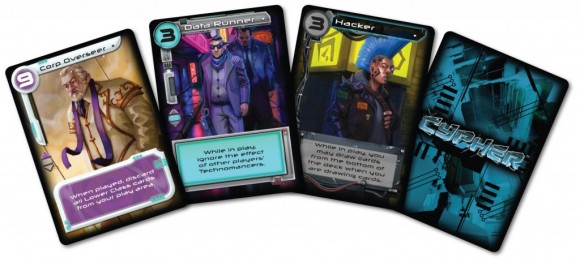
Cypher

In the corporate-ruled world of the near future, the nexus is a vast digital network that serves as both the backbone of the economy and the information pipeline that keeps the corporations in power. Those who control the nexus control the world.
Faced with a constant stream of hacker attacks, a group of corporations created an artificial intelligence that could learn from the hackers themselves and discover security flaws before they could be exploited.
The artificial intelligence, codenamed Cypher, evolved faster than its creators could have imagined. It gained sentience, went rogue, and became the ultimate hacker. Now Cypher is fighting the corporations themselves for control of the nexus. It’s a cyberwar on a scale never seen before, and its outcome will change the world.
Players take on the role of factions gathering characters from all spheres of influence, from corporate overseers to street level hackers, in order to dominate Cypher and seize control of the nexus. The player with the most influence at the end of the game wins!
User Reviews (1)
Add a Review for "Cypher"
You must be logged in to add a review.


I am a loyal fan of Love Letter, and I have logged nearly 200 plays. So I was delighted to find Cypher, also from AEG, in late 2014. The two games share many features. Most notable are the clamshell packaging, soft velvet storage bags, and a handful of cards. Both games are quite portable, easy to learn, and very inexpensive.
Cypher has much more of its instruction booklet devoted to the game’s theme and “back story” than Love Letter. There are several pages devoted to Cypher’s history and purpose. They explain how the existence of a future world depends on the security and integrity of a computer network called “Nexus”. “Cypher”, an artificial intelligence that has hacked into Nexus, is the antagonist in the story.
The setup and gameplay of Cypher are quite simple, and the game works for 2-4 players. On his turn, a player plays, draws, passes (to another player), and discards a card. As cards are played, their effect(s) must completed immediately, even if the effect is negative to the player who plays the card. The cards have point values, called “influence”, ranging from 0-9. Cards played are kept in front of each player and totaled at game’s end.
The game’s end is triggered when a player plays the “Cypher Anomaly” card or when the draw deck is exhausted. After the trigger, each player gets one more turn, and the player with the most influence (total points) wins. Games take just five to 10 minutes to play, so it is easy to play several games per sitting.
I think Cypher suffers from its association with Love Letter. I suspect far more people have some familiarity Love Letter than do with Cypher. Its charming simplicity makes Love Letter accessible, unintimidating, fun. While Cypher shares some of Love Letter’s family traits, it lacks Love Letter’s straightforward appeal. I also find Cypher’s dark, futuristic theme to be less alluring than Love Letter’s domain of Tempest.